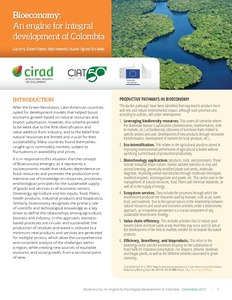Bioeconomy: An engine for integral development of Colombia
After the Green Revolution, Latin American countries opted for development models that helped boost economic growth based on natural resources and import substitution. However, this scheme proved to be weak due to the little diversification and value addition from industry, and to the belief that natural resources are limited and crucial for their sustainability. Many countries found themselves caught up in commodity markets, subject to fluctuations in availability and prices.
It is in response to this situation that the concept of Bioeconomy emerges, as it represents a socioeconomic model that reduces dependence on fossil resources and promotes the production and intensive use of knowledge on resources, processes, and biological principles for the sustainable supply of goods and services in all economic sectors (bioenergy, agriculture and bio-inputs, food, fibers, health products, industrial products and bioplastics). Similarly, bioeconomy recognizes the primary role of scientific and technological knowledge as a key driver to define the relationships among agriculture, biomass and industry. In this approach, biomassbased processes are circular and sustainable: the production of residues and waste is reduced to a minimum; new products and services are generated for multiple sectors, which allow the comprehensive and consistent analysis of the challenges within a region, while creating new sources of equitable economic and social growth, from a territorial point of view.

